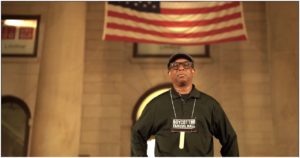Overview:
Jimmy “Barbecue” Chérizier mocked the U.S. after it announced a $5 million reward for his capture. His viral video response sparked a debate over whether Washington is genuinely serious about dismantling Haiti’s gangs or simply posturing. Many wonder if the U.S. wants Chérizier behind bars or finds his presence on the ground useful.
Editor’s Note: This editorial reflects the views of The Haitian Times leadership team. It was written by Fritznel D. Octave.
Shortly after U.S. prosecutors announced a bounty of $5 million to help them capture Jimmy “Barbecue” Chérizier, the most notorious gang leader in Haiti today, he responded quickly in a video that went viral.
‘If the FBI wants me, I’m here,’ he declared within hours of the U.S. announcement.
Delivered in plain English, Chérizier’s defiance was as much a taunt as a dare — to Washington, to Haitian authorities and to anyone who still believes in the possibility of justice. He’s not hiding.
The immediate reaction from Haitians was telling. Many mocked what they saw as U.S. hypocrisy. How, they wondered, can the world’s most powerful government — capable of tracking down and killing Osama Bin Laden, the world’s most wanted terrorist — not find a man who literally parades around Port-au-Prince with minimal protection, holds press conferences and grants media interviews?
Similarly, a slew of other notorious Haitian gang leaders long on the FBI’s wanted list remain free despite large rewards for tips. Several — Johnson “Izo” André of 5 Segond, Joseph “Lanmo Sanjou” Wilson of 400 Mawozo and Vitél’Homme Innocent of Kraze Baryè — are even members of Viv Ansanm. That coalition, led by Chérizier, controls huge swathes of the capital and key trade routes.
Like those gang bosses, Chérizier certainly isn’t losing any sleep over the U.S. indictment.
The US is offering up to $5 million for information leading to the arrest or conviction of Haitian gang leader Jimmy “Barbecue” Cherizier after an indictment accused him of conspiring to evade sanctions.
What would Washington gain?
The reward, some believe, is merely a performance for international audiences, not a serious manhunt. If U.S. authorities ultimately capture Chérizier, the benefits would seem clear. Removing him could signal a U.S. commitment to helping restore order in Haiti and protecting its geopolitical interests in the Caribbean. Chérizier is sanctioned by the U.S., Canada and the UN for human rights abuses, including his alleged role in the 2018 La Saline massacre.
There is also precedent. Over the past 20 years, the U.S. has conducted successful operations to extradite Haitian drug lords and influential political figures tied to narcotics trafficking, such as Guy Philippe in 2017, Beaudoin “Jacques” Kétant in 2003, Fourel Celestin in 2004, Jean Eliobert Jasmé or several other powerful businessmen and former officials accused in the assassination plot of President Jovenel Moïse in July 2021.
“If the FBI wants me, I’m here. I am willing to collaborate with them on one condition: there can be no lies told.”
Jimmy “Barbecue” Chérizier, Indicted Haitian gang leader
It even nabbed Pierre Réginald Boulos recently on an immigration violation and gang ties.
So, the question becomes: If Washington could seize people who are much less visible, why hasn’t it arrested Chérizier?
Why Haitians are skeptical
As it were, our skepticism already runs deep. For decades, Washington has taken actions in Haiti that only suited its own interests. It has poured billions into international missions, with abysmal results. Haiti remains poorer, less secure and more dependent than ever.
In the case of Chérizier, many Haitians see a pattern. He operates openly, often strolling or marching along the streets, surrounded by his men and live-streaming on Facebook and TikTok. Why has he not been arrested, despite years of warrants and sanctions? Is it because he is, in some way, still useful — as leverage in negotiations, as a scapegoat, or even as a pressure valve in a political landscape fractured by national elites and foreign influence?
Chérizier himself has added fuel to the suspicion. In his video, he denied links or at least receiving financial backing from Bazile Richardson, a Haitian American recently arrested in Texas for allegedly financing his gang. “Stop all those lies, and we can collaborate,” Chérizier said, claiming Richardson was being falsely accused.
“Bazile Richardson, aka Fredo, is innocent,” he claimed. “He has never sent any money to me to finance anything in Haiti.”
By casting doubt on U.S. prosecutors’ case, he positions himself not only as a non-fugitive but as a counter-narrator, inviting Haitians to question who is telling the truth. By contradicting the U.S. government and daring it to come get him, this person—labeled by the Trump administration as a foreign terrorist— is also trying to sway public opinion in favor of his self-appointed role as a truth teller. What a way to call a bluff.
US says Haitian American sent cash to “Barbecue” for gang operations in Haiti.
Trust neither Barbecue nor Washington
Here lies the heart of the matter: Whom should we trust? From what we can see, Haitians should not put their trust in either side.
- Chérizier is no revolutionary freedom fighter by any measure, as he aims to have people view him. He is a former police officer turned gang boss who has admitted to terrorizing his own people by demeaning various neighborhoods for years. His claim to being “willing to collaborate” with the FBI reeks of self-preservation, not civic responsibility.
- The U.S. government, for its part, may well have the power to remove Chérizier. But whether it chooses to do so, and for whose benefit, is another matter entirely. Its track record of selective pursuit of justice in Haiti is shown in the arrest or sanction of drug kingpins and corrupt officials, who interfered with American-run enterprises, and who later resurfaced after working out plea deals and cooperation agreements.
For Haitians, then, the lesson is sobering. We can’t trust either the gang leader’s posturing or Washington’s grandstanding. We have a better chance at justice if we work to reclaim our state and institutions from both the criminals and the foreign powers that shape our day-to-day realities.
Like this:
Loading…







